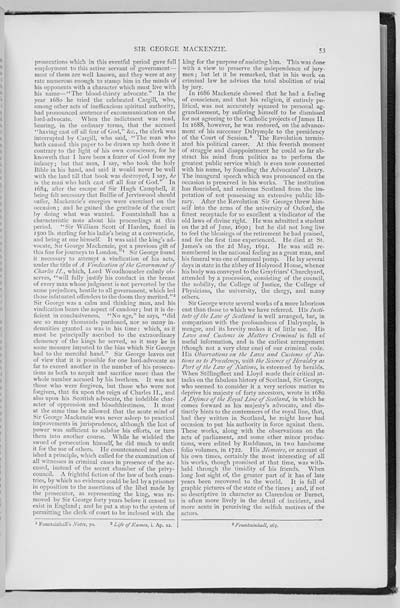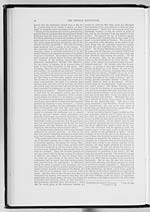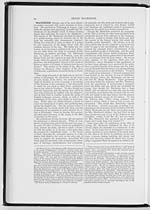53
prosecutions which in this eventful period gave full
employment to this active servant of government�
most of them are well known, and they were at any
rate numerous enough to stamp him in the minds of
his opponents with a character which must live with
his name�"The blood-thirsty advocate." In the
year 1680 he tried the celebrated Cargill, who,
among other acts of inefficacious spiritual authority,
had pronounced sentence of excommunication on the
lord-advocate. When the indictment was read,
bearing, in the ordinary terms, that the accused
"having cast off all fear of God," &c., the clerk was
interrupted by Cargill, who said, "The man who
hath caused this paper to be drawn up hath done it
contrary to the light of his own conscience, for he
knoweth that I have been a fearer of God from my
infancy; but that man, I say, who took the holy
Bible in his hand, and said it would never be well
with the land till that book was destroyed, I say, he
is the man who hath cast off all fear of God." In
1684, after the escape of Sir Hugh Campbell, it
being felt necessary that Baillie of Jerviswood should
suffer, Mackenzie's energies were exercised on the
occasion; and he gained the gratitude of the court
by doing what was wanted. Fountainhall has a
characteristic note about his proceedings at this
period. "Sir William Scott of Harden, fined in
1500 1b. sterling for his ladie's being at a conventicle,
and being at one himself. It was said the king's ad-
vocate, Sir George Mackenzie, got a previous gift of
this fine for journeys to London."1 Sir George found
it necessary to attempt a vindication of his acts,
under the title of A Vindication of the Government of
Charles II., which, Lord Woodhouselee calmly ob-
serves, "will fully justify his conduct in the breast
of every man whose judgment is not perverted by the
same prejudices, hostile to all government, which led
those infatuated offenders to the doom they merited."2
Sir George was a calm and thinking man, and his
vindication bears the aspect of candour; but it is de-
ficient in conclusiveness. "No age," he says, "did
see so many thousands pardoned, nor so many in-
demnities granted as was in his time: which, as it
must be principally ascribed to the extraordinary
clemency of the kings he served, so it may be in
some measure imputed to the bias which Sir George
had to the merciful hand." Sir George leaves out
of view that it is possible for one lord-advocate so
far to exceed another in the number of his prosecu-
tions as both to acquit and sacrifice more than the
whole number accused by his brethren. It was not
those who were forgiven, but those who were not
forgiven, that fix upon the reign of Charles II., and
also upon his Scottish advocate, the indelible char-
acter of oppression and bloodthirstiness. It must
at the same time be allowed that the acute mind of
Sir George Mackenzie was never asleep to practical
improvements in jurisprudence, although the lust of
power was sufficient to subdue his efforts, or turn
them into another course. While he wielded the
sword of persecution himself, he did much to unfit
it for the use of others. He countenanced and cher-
ished a principle, which called for the examination of
all witnesses in criminal cases in presence of the ac-
cused, instead of the secret chamber of the privy-
council. A frightful fiction of the law of both coun-
tries, by which no evidence could be led by a prisoner
in opposition to the assertions of the libel made by
the prosecutor, as representing the king, was re-
moved by Sir George forty years before it ceased to
exist in England; and he put a stop to the system of
permitting the clerk of court to be inclosed with the
1 Fountainhall's Notes, 70. 2 Life of Kames, i. Ap. 12.
king for the purpose of assisting him. This was done
with a view to preserve the independence of jury-
men ; but let it be remarked, that in his work on
criminal law he advises the total abolition of trial
by jury.
In 1686 Mackenzie showed that he had a feeling
of conscience, and that his religion, if entirely po-
litical, was not accurately squared to personal ag-
grandizement, by suffering himself to be dismissed
for not agreeing to the Catholic projects of James II.
In 1688, however, he was restored, on the advance-
ment of his successor Dalrymple to the presidency
of the Court of Session.3 The Revolution termin-
ated his political career. At this feverish moment
of struggle and disappointment he could so far ab-
stract his mind from politics as to perform the
greatest public service which is even now connected
with his name, by founding the Advocates' Library.
The inaugural speech which was pronounced on the
occasion is preserved in his works. The institution
has nourished, and redeems Scotland from the im-
putation of not possessing an extensive public lib-
rary. After the Revolution Sir George threw him-
self into the arms of the university of Oxford, the
fittest receptacle for so excellent a vindicator of the
old laws of divine right. He was admitted a student
on the 2d of June, 1690; but he did not long live
to feel the blessings of the retirement he had praised,
and for the first time experienced. He died at St.
James's on the 2d May, 1691. He was still re-
membered in the national feeling as a great man, and
his funeral was one of unusual pomp. He lay several
days in state in the abbey of Holyrood House, whence
his body was conveyed to the Grayfriars' Churchyard,
attended by a procession, consisting of the council,
the nobility, the College of Justice, the College of
Physicians, the university, the clergy, and many
others.
Sir George wrote several works of a more laborious
cast than those to which we have referred. His Insti-
tute of the Law of Scotland is well arranged, but, in
comparison with the profoundness of Dalrymple, is
meagre, and its brevity makes it of little use. His
Laws and Customs in Matters Criminal is full of
useful information, and is the earliest arrangement
(though not a very clear one) of our criminal code.
His Observations on the Laws and Customs of Na-
tions as to Precedency, with the Science of Heraldry as
Part of the Law of Nations, is esteemed by heralds.
When Stillingfleet and Lloyd made their critical at-
tacks on the fabulous history of Scotland, Sir George,
who seemed to consider it a very serious matter to
deprive his majesty of forty ancestors, wrote in 1680
A Defence of the Royal Line of Scotland, in which he
comes forward as his majesty's advocate, and dis-
tinctly hints to the contemners of the royal line, that,
had they written in Scotland, he might have had
occasion to put his authority in force against them.
These works, along with the observations on the
acts of parliament, and some other minor produc-
tions, were edited by Ruddiman, in two handsome
folio volumes, in 1722. His Memoirs, or account of
his own times, certainly the most interesting of all
his works, though promised at that time, was with-
held through the timidity of his friends. When
long lost sight of, the greater part of it has of late
years been recovered to the world. It is full of
graphic pictures of the state of the times; and, if not
so descriptive in character as Clarendon or Burnet,
is often more lively in the detail of incident, and
more acute in perceiving the selfish motives of the
actors.
3 Fountainhall, 267.

![]() Universal Viewer |
Universal Viewer | ![]() Mirador |
Large image | Transcription
Mirador |
Large image | Transcription
![]()

